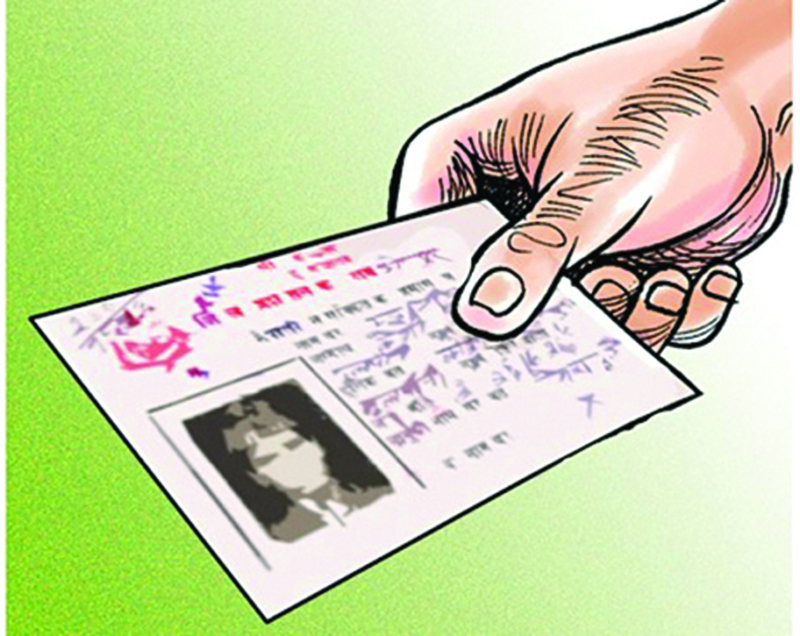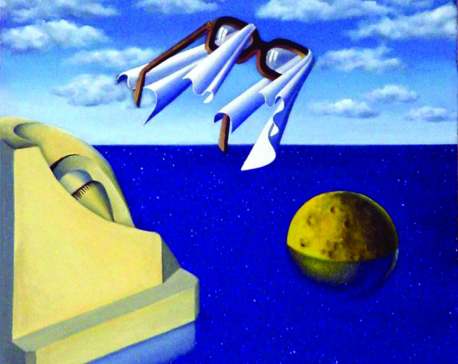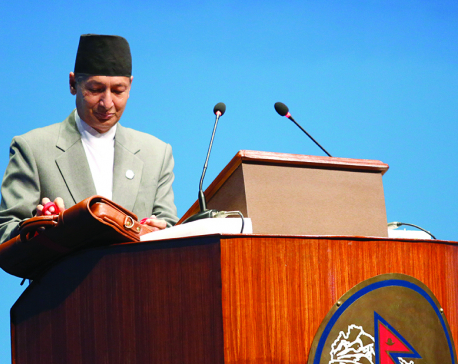
OR
Citizenship Debate

We need to bring around every actor from the plains as well as the hills to agree on some basic fundamentals of citizenship. Otherwise, citizenship debate will prolong indefinitely
Past few weeks, citizenship debate dominated Nepal’s mediascape. There was rage and reaction, emotional appeal and even misleading arguments. Those watching it from outside must have inferred that Nepal is still the most discriminatory state in terms of citizenship rights. I will present my arguments in a while but let me summarize those reactions.
A group of people argued that there should be no ifs and buts when it comes to granting equal citizenship rights to women. They said Nepal is one among 27 countries in the world that denies equal citizenship rights to women and it must not remain in the club of those ‘racist’ states.
Others argued if my son can pass on citizenship to his children without having to identify who their mother is why should not my daughter be able to do the same without having to identify who her father is? Why should my daughter be shackled with the burden of having to prove who the father of the child is when the same father does not have to prove who the mother of the child is?
Then there were those who declared with pride that Nepal has nothing to attract foreigners to come, take citizenship and settle down here. More and more Nepalis are leaving the country, they said. Why should such a country even worry about foreigners coming to Nepal? No sane foreigners would be crazy about coming to Nepal and settling down here so as to cause threat to Nepal’s sovereignty. One famous columnist went to the extent of saying if granting equal citizenship rights to women leads to dissolution of our society, even the country, so be it.
These views are demeaning and insulting. I mention it here because it reflects how passionately Nepali commentariat feel about citizenship issue and also how shallow our debates on sensitive issues become at times. In this cacophony and cries, nobody cared to offer solutions. It is when debates fly into abstractions, when emotion, not reason, guides it that there is a danger of people and lawmakers being misled.
Points of contention
Let me simplify main points of contention. According to the constitution and the citizenship bill, I (by virtue of being a man) can marry a woman of any nationality I like and confer her citizenship through my name. She does not even have to renounce the citizenship of her country of origin for this. Only showing the evidence of initiating the process of renouncing it suffices. My wife becomes naturalized citizen of Nepal. She can vote, take up the government job, become a minister, and head of constitutional bodies such as election commission and human rights commission (she has to have lived in Nepal for 10 years after marrying me to be eligible for the last one). But she cannot become President, Vice-president, Prime Minister, Chief Justice, Chief Minister and chiefs of security bodies (see Article 289, The Constitution of Nepal). If my intention is to get my wife appointed in one of these posts, and if she has married me only for that purpose, our constitution says no.
My children become the citizens of Nepal by descent and can vie for any of these positions. When they turn 16, I can go to District Administration Office, furnish necessary documents and the CDO will give them citizenships without questioning who my wife is, whether she lives with me or not, whether I have provided for her needs.
It would not be so if I were a woman. First even if I marry a Nepali man, have a child from him and if I have to make his citizenship certificate, the CDO will ask me several questions. I will be asked to furnish several proofs.
If I have married a foreigner and want him to come to Nepal and live with me, he will not get the citizenship certificate as easily as if I were a man and married a foreign woman. If I have a son from him, for me to get citizenship of descent for him, I will have to declare that my husband is unidentified. If I say he is a foreigner, I will have to prove that my son has not acquired citizenship from his father’s country and when proved, he will be given naturalized citizenship.
Bride and prejudice
We need to get to the root of how this unequal provision was born to figure out if it could be corrected.
Citizenship was one of the major bones of contention during the constitution drafting process. Like now, political leaders, rights activists and commentators had their own opinions and arguments. While many Nepali Congress and CPN-UML leaders stood in favor of putting foreigners (both men and women) marrying Nepalis under ‘period of incubation’ before granting them Nepali citizenship, Madhesi leaders flatly rejected that proposal. They argued that Madhesis have roti-beti relations with communities across the border, Madhesis marry Indian brides and Indians marry Madhesi brides and therefore any legal frameworks that potentially disrupt this matrimonial tie will be unacceptable. They advocated that their buharis should be entitled to every right of a Nepali citizen from the day they come to Nepal as brides.
Finally, the makers of the constitution, by design, default or under pressure, considered the question of foreignness by keeping mainly India in mind. So they became more flexible on foreign women marrying Nepali men than Nepali women marrying foreign men.
So our constitution and law, in a way, consider foreign women married to Nepalis as less foreign than foreign men married to Nepali women. Constitution and citizenship law have clarity on what to do with foreign women married to Nepali men but silent about foreign men marrying Nepali women. The debate should have been focused on this.
Critique on reason
Only person to clearly speak on this matter was Yasoda Subedi Gurung, the member of Parliament’s State Affairs Committee and its sub-committee formed to finalize the issue within 15 days (with effect from March 22). There must be no discrimination between men and women in the process of transferring and acquiring citizenship, she said. In an interview with Onlinekhabar, she clearly said the decision of letting foreign women to acquire Nepali citizen immediately after marriage was a mistake, that it needs to be corrected and the way to do so would be by putting a cap of 10 years for both foreign women and men marrying Nepali citizens and wanting to settle down here.
This sounds like a reasonable solution but who will listen? Already people are interpreting this line of argument as conspiracy to disenfranchise Madhesis. Imagine what will happen if the subcommittee actually takes the decision to this effect. Madhesi leaders are surely going to rise against it, and might even launch another protest.
Misinformation campaign spreads wide. Think of how Nepal’s citizenship provision was misinterpreted in Nepal and India around 2015. Many propagated it to mean Nepal’s constitution leaves Indian women married to Madhesis stateless.
Set some fundamentals
Perhaps Nepal is the only country that is debating citizenship issue for the past 70 years. We must put the debate to rest. For that we must agree on some fundamentals.
First of all, let us all agree that the same provisions should guide the process of acquiring and transferring citizenships both for Nepali men and Nepali women, irrespective of whether they marry Nepalis or foreigners. Just as father alone can pass on citizenship to his child, let a mother do the same but let’s make both mention the names of their spouses. A man should not be allowed to pass citizenship to his child without mentioning the status of his wife.
Let us agree that if my daughter marries a foreigner and wants to bring her husband to Nepal to live here permanently, and if my son wants to marry a foreign woman, brings her here to live, both need to live here at least for 10 years before they acquire citizenships. Let us agree to provide them resident permits or other provisions for the period in between.
For this, we need to correct the current provision of allowing foreign women marrying Nepalis to acquire citizenship immediately after marriage. Try this, and Madhes might erupt in rage.
We need to be clear on whether we want to ensure equal provisions for men and women or whether we want to make Nepal the world’s most flexible and liberal citizenship regime. We need to bring around every actor from the plains as well as the hills to agree on some basic fundamentals. But since this is not going to happen any time soon, it seems, citizenship debate will prolong indefinitely.
You May Like This

Roots of Puerto Rico’s crisis
Its unique governance structure allows both the Puerto Rican government and the US federal government to blame each other for... Read More...

Erosion of reason
Why cannot Nepali intellectual community give a clear opinion on pressing political issues? What has led to this intellectual slackening? Read More...

Failing to impress
The well-known economist was expected to take drastic measures to rejuvenate the country’s economy but this has not happened under... Read More...







Just In
- NRB to provide collateral-free loans to foreign employment seekers
- NEB to publish Grade 12 results next week
- Body handover begins; Relatives remain dissatisfied with insurance, compensation amount
- NC defers its plan to join Koshi govt
- NRB to review microfinance loan interest rate
- 134 dead in floods and landslides since onset of monsoon this year
- Mahakali Irrigation Project sees only 22 percent physical progress in 18 years
- Singapore now holds world's most powerful passport; Nepal stays at 98th












Leave A Comment